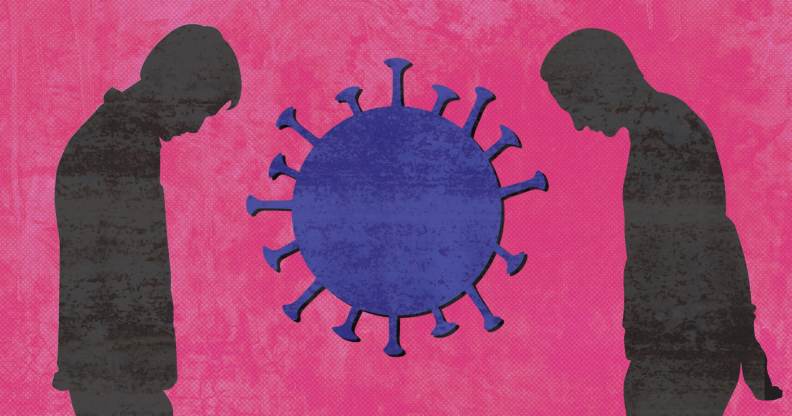Sexual health experts warn mpox outbreak is far from over: ‘We can’t be complacent’

The health agency said in a statement on 28 November that both monkeypox and mpox would be used for the next year, while the former name is “phased out”. (PinkNews/Getty)
Manchester sexual health experts have warned it’s “vital” to remain “vigilant” for mpox, despite a decrease in cases across the UK.
Formerly called monkeypox, but recently renamed mpox by the World Health Organization due to reports of racism and stigmatising language, mpox should continue to be talked about, experts have told PinkNews.
Anyone can get mpox, though most cases reported have been in men who are gay, bisexual or men who have sex with other men.

Craig Langton, sexual health coordinator at the LGBT Foundation, says “it’s important for events to keep the conversation going”.
“I know of people who’ve had mpox and they’ve said their friends haven’t spoken to them or come near them in ages.
“People are still scared to go around them, so I think it’s really important for us to look out for one another.”
Dr Chris Ward, consultant sexual health and HIV for Manchester University NHS Foundation Trust, agreed with Langton and says people in the queer community “need to remain vigilant for mpox”.
He also points out the “stigma” surrounding the rare virus, which led to the recent changing of its name.
“I think that [the stigma] did sort of drive a lot of people to have a mistrust of attending for vaccines because there was some stigma in the mainstream press,” he tells PinkNews.
“A lot of ‘slut shaming’ also surrounds the virus”, which Ward says is a “major problem in sexual health”.

“There’s always work that can be done, we certainly should try to address stigma as much as we can through various interventions across Greater Manchester,” Dr Ward says.
In a bid to decrease the amount of stigma currently present in his field, Ward has implemented a stigma training module across the Greater Manchester Trust.
Jon Dunn, sexual health facilitator for the North West, said it’s important people who are yet to come forward for a first dose, do so.
“If you’ve already had a first dose, please come forward for a second,” he adds.

In order to meet the demand for the mpox vaccine, a Manchester sexual health clinic became the first in the UK to offer fractional dosing.
Fractional dosing meant vaccines could reach five times as many people.
Manchester’s sexual health services also worked to ensure as many people as possible were vaccinated ahead of Manchester Pride.
Jane Pilkington, director of population health for NHS Greater Manchester, says the conversation around the virus is continuing, with the services “still doing about 40 to 50 per cent of vaccinations as first doses”.
“The demand is still there. Since about the first of October we’ve had the supply needed to meet the demand,” he shares.
“We’re unclear of what lies ahead in the future – It’s great and encouraging to see cases are low – but we can’t be complacent.
“What we do know is that vaccines and reducing exposure are the best defence.”

Dunn echoed Pilkington’s advice and said it’s important people recognise the symptoms of mpox and know what do to if they’re concerned.
Initial symptoms of monkeypox are flu-like, including fever, headache, muscle aches, backache, swollen lymph nodes, chills and exhaustion.
Ward added: “There’s so much mpox internationally that it will be very difficult for us to get rid of all imported cases.”

Richard Scarborough, commissioning manager of Manchester City Council public health team, told PinkNews clinics are now allowing “more people to assess their own eligibility to come forward for the vaccination”.
This approach aims to reduce stigma surrounding the virus and allow for discrete vaccination.
“We’ve worked with lots of partners to make sure there’s lots of information out there so people can identify their own risk,” he tells PinkNews.
“It’s been successful in ensuring when we’ve had a walk-in or clinic bookings we’ve been pretty much at maximum capacity.”
Going into the Manchester Pride weekend (26 to 29 August) NHS Greater Manchester Integrated Care managed to provide 2,379 people with their first mpox vaccination doses, a spokesperson for the service told PinkNews.
Since Pride, an additional 701 people have received first doses and 875 people have had second doses.
According to the spokesperson for NHS Greater Manchester, demand remains relatively steady for first doses, with more than 3,000 doses administered so far.
However, second-dose demand isn’t yet as high, with 900 vaccines having so far been given.
Further information about mpox can be found here.
How did this story make you feel?

